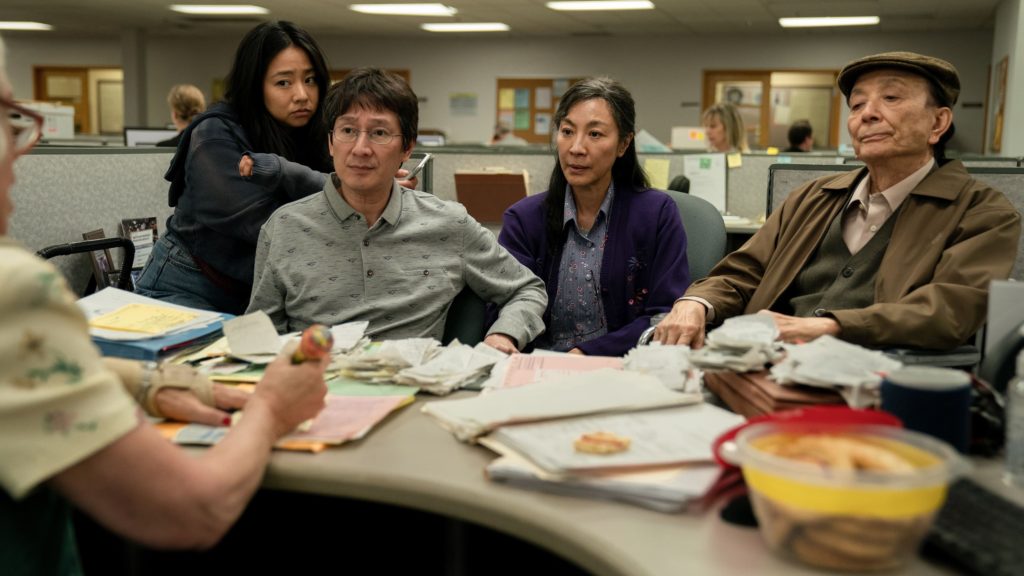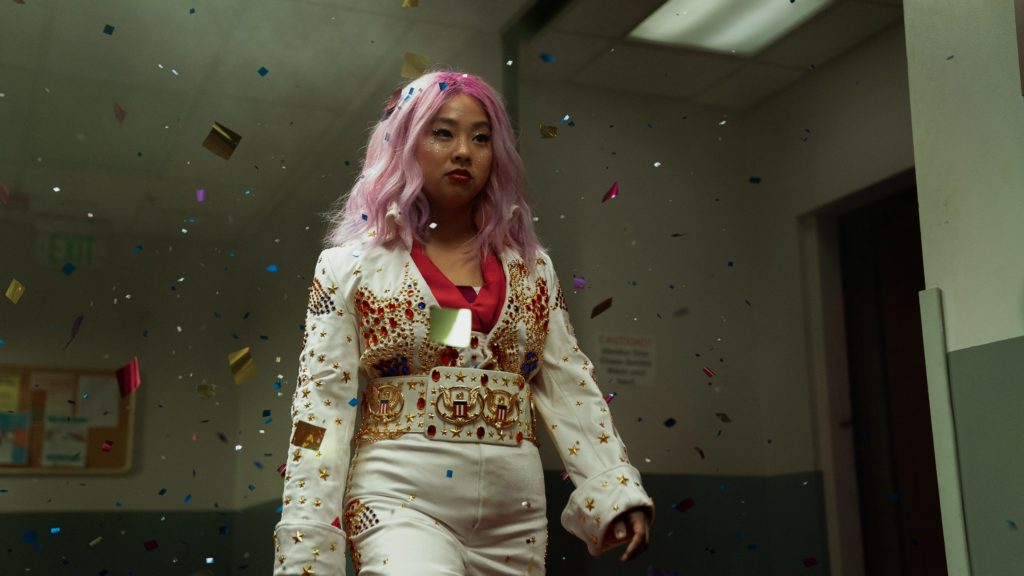You can’t take the middle ground on this film. You’re either along for the ride or you’re stuck at the boarding station. Would you rather a film be great — ambitious, maximalist, shameless — or good — coherent, focused, tasteful? Everything Everywhere All at Once is, pretty undeniably, a great film. It’s the kind of film that fans will be dissecting for years, pointing out little bits of symmetry and cleverness they missed until the umpteenth viewing. And the cynics will point out that, if you look hard enough at a climax that runs 75 minutes with little plot momentum but jokes and images layered on top of each other, you’re bound to find stuff that seems witty.
And so I paused before reviewing this film. I’ve paused nearly a month, in fact, not quite sure what to say about it. A simple ledger tally of things that work and things that don’t will not give you an answer as to overall effectiveness of this film. At some point, one must take an ideological stand: Do we reward it as a great achievement, or do we punish all the broken things that are decidedly not good in its bloated runtime?

After some reflection, I side with the great, not the good (in spite of this site’s rating system). I choose to praise the mad scientists who shot for the moon; who perhaps missed, but landed among the everything bagels. If more directors brought the energy and creativity to cinema that Daniels (directing/writing duo of Daniel Scheinert and Daniel Kwan) do to Everything Everywhere All at Once, going to the theater would be a much more inspiring experience. That’s not to say every movie should be this exhaustingly big, but no movie has so drowned me in awe-inspiring creative scope since Cloud Atlas, and I wish more filmmakers would try.
I suppose I should articulate exactly what makes it so breathtaking and simultaneously frustrating. Let’s start with the latter.
For everything that Everything does right, it doesn’t even fulfill its own promise. After a long introduction where we meet the real-world challenges of Evelyn (Michelle Yeoh), the film outlines for us concept of the multiverse: a sprawling web of alternate dimensions where something is different, by some small or large degree, from our own world. We learn the dimension-hopping rules as we explore various roads not traveled in Evelyn’s life. The first inflection point is her decision to emigrate to America with Waymond (Kay Huy Quan); we see how she ends up a kung fu star in that dimension (already a confusing bit of meta construction in the ways it mirrors the life of real kung fu star Yeoh). Thus, we’re to believe that much of the film will show us the butterfly effect of alternate outcomes of other moments in her life: perhaps choosing not to have a baby, or having a son instead of a daughter, or working a steady 9-to-5 rather than buying a laundromat with her husband.

But then Daniels get bored with the very premise of their own film, just as the structure is taking taking shape. They toss the butterfly effect investigation to the wind in favor of wacky absurdism. It’s head-spinning, and also emblematic of the film’s other big problem: It aggressively leans on its surreal humor above all else. It’s not sufficient to have a goofy cutaway to an alternate dimension where people have hot dog fingers and Evelyn is married to her IRS auditor (Jamie Lee Curtis); we must revisit that gag fifteen times, because jokes, we know, get funnier if you tell them over and over. Same goes for the Raccacoonie bit: the novelty of seeing a joke about a misunderstood Pixar movie is funny upon the first cutaway; increasingly less so as it becomes a recurring beat. The unfiltered “randomness” of the jokes is a bit tiring even when it’s clever.
And then there’s the matter of the film’s pacing and lack of modulation. This movie is nearly two and a half hours, nearly a third of that making up an endless montage sequence that cuts between the various universes as the film builds to its finale. The editing and sound design are astronomically rich, and Daniels find moments of substantial dramatic power, but it feels like running a 800m dash — structured like a sprint but really an endurance test.
So after all, that, what’s left? What is so “great” about this movie? Well, honestly, everything. (Everywhere. All at Once. Okay, that’s the one time I’ll do that.) Even the flaws are noble in a way; they are the product of the film leaning into its own idiosyncracies so that it may be the biggest, best version of itself.

The acting is tremendous for what boils down to an elaborate quasi-superhero film: I’ll be rooting for Yeoh to get all the awards this winter, or at least nominations. It’s a career-defining turn, calling on all her acting faculties: action, drama, comedy, etc, all while still assembling the portrait into something resembling a real human. It’s a magnificent performance.
But Yeoh is far from the only great performance. In fact, pretty much the entire ensemble shines: Quan, Curtis, Stephanie Hsu, and James Hong all carry the film in different ways. Hsu as daughter Joy and supervillain Jobu is an especially elastic performance, providing one half of the film’s big emotional thrust — a crumbling mother-daughter relationship — along with Yeoh.
The human element brought by the actors allows the full sweep of the creative vision to pop off the screen as more than wacky noodling. There’s so much going on here, it’s tough to know where to start, but the most incredible thing might be how it all ends up feeling a part of a whole. Just look at the incomplete list of universes we pop in and out of: There’s the primary dimension of a fracturing immigrant family; the kooky alternate-IRS dimension filled with postmodern fisticuffs; the universe of sentient rocks; the cosmic bagel fight scene; the butt-plug fight (no typo); the dimension where Evelyn is an actress and stars in a version of this movie herself; heck, even Raccacoonie and hot dog fingers. They all feel so texturally distinct, but tie together into a frothing-at-the-mouth scream of emotional exertion, a saddled compromise between “life is random and nothing matters” nihilism and “love is everything” big-heartedness. It’s a thematic mess, not to mention a structural and narrative one, but in an expressive sort of way, filled with bravura production details.
I doubt there will be another film this year that drowns me in the sheer possibility of film as a storytelling medium more powerfully than this. That doesn’t automatically make it my favorite movie of the year, but it does make it one of the few that I know I’ll be thinking about for the rest of my life. Damn it all; I’m along for the ride.
- Review Series: 2022: Year in Film
Is It Good?
Exceptionally Good (7/8)
Awards, Honors, & Rankings
- The B.A.D.S. (2022) - Best Title (Winner)
- The B.A.D.S. (2022) - Best Editing (Winner)
- The B.A.D.S. (2022) - Best Ensemble (Nominee)
- The B.A.D.S. (2022) - Best Visual Effects (Nominee)
- The B.A.D.S. (2022) - Best Sound (Nominee)
- The B.A.D.S. (2022) - Best Actress (Michelle Yeoh) (Nominee)
- The B.A.D.S. (2022) - Best Supporting Actress (Stephanie Hsu) (Nominee)
- The B.A.D.S. (2022) - Best Director (Nominee)
- The B.A.D.S. (2022) - Best Picture (Nominee)
- Top 10 Movies of 2022 - #3
Dan is the founder and head critic of The Goods. Follow Dan on Letterboxd. Join the Discord for updates and discussion.


One reply on “Everything Everywhere All at Once (2022)”
The everything bag is maybe a slightly bad-goofy central conceit, Evelyn underreacts in a way I found slightly bothersome to the initial imposition of the multiverse, but man, that’s it as far as my complaints go. This was my favorite movie in about half a decade, potentially longer. And for all that I still haven’t rewatched it because it *is* crazily exhausting. In a positive way, but I can see it as some kind of negative.